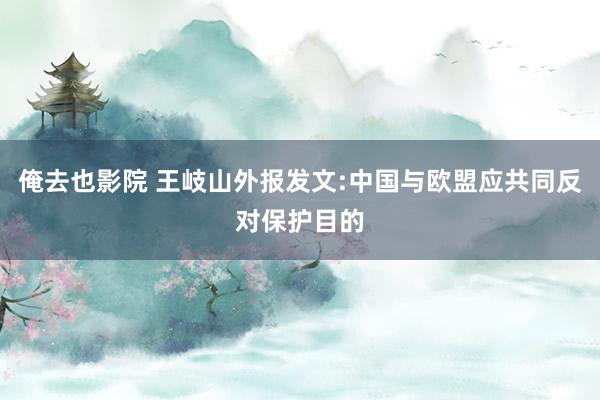
 俺去也影院
俺去也影院
贵府图:国务院副总理王岐山 中新社发 张娅子 摄
中新网5月6日电 中国国务院副总理王岐山5日在《纽约时报》网站刊载题为Distant Neighbors(远邻)的著述,示意中国与欧盟应在第二次中欧高等经济对话会上以负背负的派头,明确地作念出共同反对买卖保护目的同意。
王岐山指出,买卖解放化是经济增长的发动机。它已成为经济环球化的纷乱推能源,并使寰球各地的东说念主们受益。相背,买卖保护目的保重了一国的利益,却毁伤了其他国度的利益,比如导致相互挫折,无东说念主获益。
王岐山示意,中国刚烈地力图于矫正绽放,自中国得手加入寰球买卖组织,中国阛阓变得愈加绽放,买卖解放度愈加放宽。现在,中国的关税总水平惟有9.8%。中国的工业品平均关税惟有8.9%,在发展中国度中最低。入口农产物关税惟有15.2%,这不仅低于其他发展中国度,也远低于很多证实国度。
王岐山说,中欧两地经济不错相互提供更多契机,买卖也有很大后劲。中欧应该充分诳骗中欧高等别经济对话这个平台,加强探求与互助,共同反对买卖保护目的。这将更好地让咱们粗略卤莽面前的危境,促进经济的复苏和增长。
王岐山示意,中欧两边应当本着互助的精神,妥善处理买卖不合和争端。加强对话和推测,不摄取买卖保护次序,幸免买卖问题政事化。中国但愿欧盟不带偏见的客不雅评价中国的经济条目,尽可能较快承认中国的彻底阛阓经济地位。
国务院副总理王岐山在《纽约时报》网站著述英文原文:
Distant Neighbors
By WANG QISHAN
Published: May 5, 2009
The most pressing task facing all countries in the world today is to restore global economic growth as soon as possible. Yet it is worrisome to note that the surge of trade protectionism has made the prospects of the already fragile world economy even worse.
China and the European Union, two major economies and stakeholders in the world, should take a responsible attitude and demonstrate their common, clear commitment against trade protectionism at the second China-E.U. high-level economic dialogue.
Trade liberalization is the engine of economic growth. It has served as a strong propeller of economic globalization and benefited people around the world. On the contrary, trade protectionism — featuring the pursuit of benefits for one country at the expense of others — will only lead to retaliation. It serves the interest of no one.
The world economy paid a heavy price for the prevalence of trade protectionism during the Great Depression in the 1930s, which led to the contraction of global trade by two thirds. We should make sure that the same mistake is not repeated.
抱头摇 裸舞Europe is the birthplace of free trade theory, and the E.U. is the product of successful free trade practices. The removal of trade barriers promoted formation of a single European market and enhanced development and prosperity in Europe. As a result, the E.U. has grown into the largest economy in the world today.
China is firmly committed to reform and to opening up. Since its accession to the World Trade Organization, China’s market has become much more open and its trade greatly liberalized. The current overall tariff level of China is only 9.8 percent. Its average tariff on industrial products is only 8.9 percent, the lowest among all developing countries. Its tariff on imported agricultural products is only 15.2 percent, which is not only lower than other developing countries but also far below that of many developed countries.
The openness of China’s trade in services has reached a level close to that of an average developed country. China has taken steady steps to improve its market economic system and legal system. In particular, it has made remarkable progress in intellectual-property rights protection, product quality and food safety, environmental protection and labor security. China has also taken concrete actions against trade protectionism — the Chinese government recently sent Chinese enterprises on procurement missions to Europe and the United States.
The economies of China and the E.U. have much to offer each other and our two-way trade holds a huge potential. The E.U. is now China’s largest trading partner and China is the second largest trading partner of the E.U.
China and the E.U. should make full use of the platform presented by the high-level economic dialogue to strengthen communication and cooperation and jointly oppose trade protectionism. This would better enable us to tackle the current crisis and promote economic recovery and growth. It would also reinforce the trend of economic globalization and facilitates a further growth of two-way trade.
The two sides should work actively to put in place the agreement reached at the G-20 summit in London, promote early, comprehensive and balanced outcome in the WTO Doha round negotiations and uphold an open, fair and equitable international trading regime. An early conclusion of the Doha round is of symbolic significance to curbing protectionism.
The two sides should further open markets to each other. China will continue to lower the threshold for market access, improve trade and investment environment and encourage Chinese enterprises to increase procurement and imports from Europe.
We hope the E.U. will relax restrictions on the exports of high-tech products to China, enhance cooperation with China on the development and application of clean energy, new energy and renewable energy and support cooperation among our small and medium-sized enterprises. Meanwhile, our two sides should step up efforts to update the E.E.C.-China Trade and Economic Cooperation Agreement.
The two sides should work in a cooperative spirit and properly resolve trade differences and disputes. Each side needs to take proper care of its own interests. Yet, more importantly, both sides should accommodate the concerns of the other, taking into full account national conditions and their stage of development, and steadily broaden the scope of our common interests.
We should strengthen dialogue and consultation, refrain from taking protectionist measures and avoid politicizing trade issues. China hopes that the E.U. will evaluate the conditions of the Chinese economy in an objective and unprejudiced manner and recognize China’s full market economy status as soon as possible.
Trade liberalization was, is and will continue to be the only way to global economic prosperity. The Chinese side is ready to work with the E.U. and take effective measures to oppose trade protectionism, promote better growth of China-E.U. trade and jointly move the world economy out of the current difficulties at an early date. (Wang Qishan is vice premier of the State Council of China.)
责编:肖金平俺去也影院

